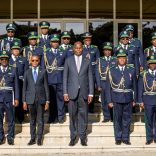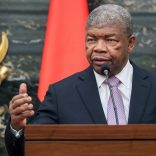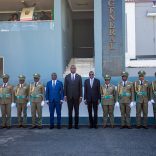Mozambique: Chapo inaugurates new INATRO headquarters
EU ready t support Mozambique, will discuss concrete options in next political dialogues

in file CoM
The European Union (EU) yesterday said it was “ closely following” the violence in Cabo Delgado, northern Mozambique, and would discuss what support it might make available elect in its “next political dialogues” with the Mozambican government.
“The EU has been following the wave of violence in northern Mozambique very closely, recognising the severe humanitarian consequences and increasing tensions in the region,” said Nabila Massrali, the European Commission spokesperson on foreign affairs and security policy.
Asked during the institution’s daily press conference in Brussels about the situation in Cabo Delgado, Nabila Massrali observed that “the Government of Mozambique and the EU have embarked on a policy of dialogue focused on humanitarian and security issues”.
“And we are ready to support the government of Mozambique. We will discuss concrete options in the next political dialogues,” Massrali explained.
The statements come after a spokesperson for the European diplomatic corps told Lusa on Thursday that the EU was advocating a broader approach to the problems of armed violence in northern Mozambique, noting that one of the programmes already under way was aimed at discouraging radicalization and recruitment.
Answering a question by Lusa, the European External Action Service pointed out that EU High Representative Josep Borrell had earlier this month responded to the request for assistance sent to him in September by the Mozambican authorities, reporting that the EU’s intention was to “encourage and support the development of an integrated approach to deal with armed violence in Cabo Delgado”.
This approach would take into account the humanitarian, development and security aspects, the so-called “three-link approach”, always “respecting international human rights standards and the rule of law”.
The EU and Mozambique have already started discussions on these three aspects. This will provide “the opportunity to discuss concrete options for assistance”, the same source said, stressing that humanitarian assistance and development cooperation for the Cabo Delgado region was already underway, with ongoing programmes constituting “important pillars of the European Union’s response”.
“Among the concrete actions underway, there is a programme aimed at discouraging recruitment and radicalization, and which aims to foster social cohesion,” he said. “The EU support also includes projects for youth and civil society, capacity building and job creation,” he noted.
The same source also told Lusa that “a project of education and vocational training is also being prepared, with European gas companies, to ensure that the local population benefits from development in the sector”.
On October 9, the EU ambassador in Maputo, Antonio Sánchez-Benedito Gaspar, delivered to the Mozambican Minister of Foreign Affairs and Cooperation, Verónica Macamo, the letter of reply from the head of European diplomacy to Mozambique’s request for assistance, in which Josep Borrell confirmed that the European bloc would help the country face the crisis in the Cabo Delgado region.
Antonio Sánchez-Benedito Gaspar explained that the idea was to strengthen Mozambique’s own response capacities, and clarifying that “the deployment of European military personnel to the country is not on the agenda”.
The province of Cabo Delgado has for three years now been the scene of armed attacks by forces classified as terrorists. The violence caused a humanitarian crisis, with more than a thousand deaths and about 250,000 people internally displaced.













Leave a Reply
Be the First to Comment!
You must be logged in to post a comment.
You must be logged in to post a comment.